September 26, 2016 0 Comments
When you buy grain-fed beef in your local grocery store, it probably has a US Department of Agriculture (USDA) grade on it. The USDA grades meat quality for tenderness, juiciness, and flavor, and there are eight quality grades for beef. How are they determined? According to the USDA, “Quality grades are based on the amount of marbling (flecks of fat within the lean), color, and maturity.”
Prime grade, for instance, “has abundant marbling,” while Choice grade (the grade most commonly found in grocery stores) is “high quality, but has less marbling than Prime.” Select grade, meanwhile, “is very uniform in quality and normally leaner than the higher grades…but, because it has less marbling, it may lack some of the juiciness and flavor of the higher grades.”

So for the USDA, the grading is largely based on the marbling. Why? Because feeding cows grain not only gets them fatter quicker, it also enhances fat marbling. Marbling is the intramuscular fat that adds juiciness and some elements of tenderness to beef. Because almost all US cattle are finished on grain, and have been for decades, marbling became the quickest and easiest way to grade the beef.
This is why a lot grass-fed beef producers say their product gets the short end of the steak when it comes to grading. They’ll tell you that their grass-fed beef is leaner and healthier than grain-fed beef, but not as marbled, so for them to get a USDA Choice or Prime grade for their grass-fed beef is impossible. And frankly, for THEIR grass-fed beef, it probably is.
But it’s not impossible for our grass-fed beef to get a USDA Choice or Prime grade; we know that because ours does. In fact, Joyce Farms is one of only a few grass-fed beef producers in the country that elects to have our beef USDA quality graded.
Because we have cattle with the right genetics and we utilize superior raising and forage grazing standards, our grass-fed beef can offer the tenderness, the delicious taste and, yes, the marbling required to get a USDA Choice or Prime grade. Want proof? Just check this out...

So don’t believe the myth that a delicious, well-marbled, USDA Choice or Prime grade grass-fed steak is unrealistic, and that off-flavors, lack of marbling, and a lack of tenderness is part of the grass-fed eating experience. To top it all off, that added marbling is loaded with healthy Omega-3’s and CLA’s and other healthy fats. If you’re looking for grass-fed beef that’s healthy and makes the grade, look no further than our Heritage Aberdeen Angus Beef.
Note to our web shoppers: The cuts sold on our web store are USDA Choice or Select grade, and grades are noted in product descriptions. Due to such high demand from our foodservice customers, we are unable to offer Prime Grade on the web at this time, but you can find it on the menus of a number of fine-dining restaurants across the United States!
September 21, 2016 0 Comments
Joyce Farms Poulet Rouge Fermier® chickens have it pretty good. Not only do we raise them naturally and according to some of the same standards used in the French Label Rouge program; We also make sure they live a happy life, doing what chickens like to do, growing in their own space and at their own pace.
What’s a typical day like for a Poulet Rouge® chicken? It starts early – they’re up with the chickens. Not because we make them get up, but because, well, they’re chickens. They roam freely in a small, comfortable poultry houses, surrounded by their fellow chickens. The flocks are small, so each bird has plenty of room, and all of the birds are sure to get the care and attention they deserve.
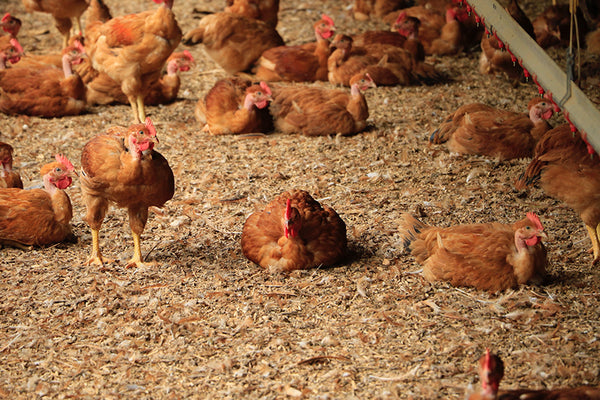
They’re given access to the outdoors from 9 a.m. until dusk, so the birds can have their own version of “recess” — running, socializing, or just relaxing and catching some rays.
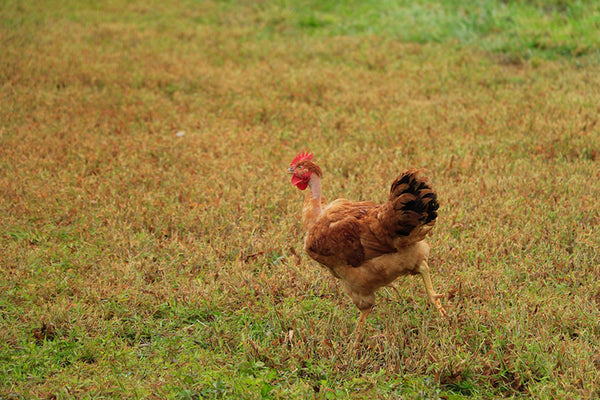
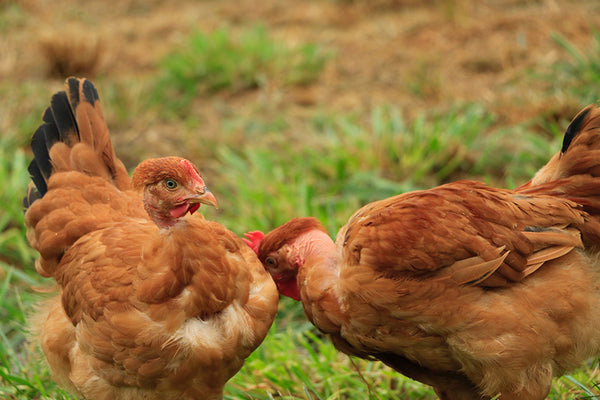
They’re given music to listen to (usually classical, which seems to soothe them), and toys to play with, like these hanging CDs. Chickens love bright shiny objects.
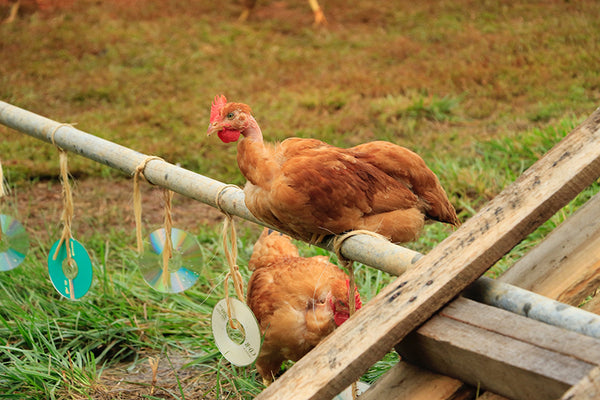
Occasionally they might even engage in some yard games, like this friendly staring contest.
July 26, 2016 0 Comments
Look out for us in the August issue of The Local Palate! Read about our unique heritage poultry operations, slow growth breeds, traditional methods, and how we achieve that unbelievable flavor.
click image or here to read
July 20, 2016 0 Comments
According to a study by the International Food Information Council Foundation, the majority of shoppers say taste has the biggest impact on their food choices — more than price, convenience, sustainability, or even nutrition. What that means for producers of grass-fed beef is that they can tout its nutritional and ecological superiority all day long, but if it doesn't taste good, people won’t eat it.
One of the biggest complaints about grass-fed beef is inconsistent taste and off flavors. The reality is, grass-fed beef can taste as good or even better than grain-fed beef — the difference comes down to three key variables: grass, grazing, and genetics.
If grass-fed beef doesn’t get the right forage – the perfect cocktail (as we call it) of mature grasses and legumes – it doesn’t always taste good. A lot of grass-fed cattle are raised in what’s called a “monoculture pasture” where the grasses are at a single root depth, and they draw their mineral content from only one layer of soil. The result is meat that can have a metallic flavor. However when grass-fed cattle are raised in multi-culture pastures, eating forage made up of a variety of grasses and legumes that provide a balanced mineral intake from multiple root depths, there is no metallic taste in the meat.
It’s not just the variety of things the cattle eat that matters. It also matters when they eat them. Grass-fed beef can have an off-flavor that tastes of liver or game when the cattle’s forage isn’t mature enough and contains too much protein and not enough carbohydrate (sugars). To prevent this, the forage can be measured for Brix. Without getting too scientific, Brix is a measurement of the sugars, amino acids, oils, proteins, flavonoids, minerals and other nutrients in a food. By monitoring Brix levels closely, the cattle can be brought to pasture for grazing when the forage is at optimum maturity, so they only eat the sweetest grass and have the best tasting meat.
Producing great-tasting grass-fed beef isn’t as simple as just switching to a grass-fed diet; you have to start with the right cattle. Most beef produced in America today comes from modern cattle that have been selectively bred to produce larger animals that finish well in a commercial feed lot; they just aren’t built for a grass-based diet. In fact, less than 5% of cattle genetics in the US will produce quality beef on grass.
Our Heritage Beef comes from true Aberdeen Angus cattle raised exclusively in multi-cultural pastures eating forage that is mature and sweet. Joyce Farms maintains a bloodline of this prized heritage Aberdeen Angus breed – the original Angus of 18th century Scotland.
There are a lot of different grass-fed beef producers out there, and it’s important to know that not all grass-fed beef is the same. At Joyce Farms, we go to these lengths because we’re just like you – if we’re going to eat our grass-fed beef (and we are), we want it to taste delicious (and it does).
July 15, 2016 0 Comments
Here's a sneak peak at our healthy, happy, heritage turkey poults! They're only 1 week old, but they're already feeling right home on our farms with lots of TLC from our dedicated farmers.
These special birds carry the heritage genetics of the traditional Spanish Black turkey, a slow-growing breed believed to be one of the first developed from Native American stocks. We raise them free range on our farms with nothing added, ever — no added hormones, steroids, antibiotics, or anything artificial.
June 16, 2016 0 Comments
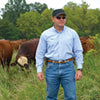 Written By Dr. Allen Williams, Ph.D.
Written By Dr. Allen Williams, Ph.D.
A champion of the grass-fed beef industry as well as cutting edge grazing methodology, Allen helps restore natural soil water retention and reduce runoff, increase land productivity, enhance plant and wildlife biodiversity, and produce healthier food. Learn more about Allen
It’s my privilege to serve on a number of industry boards and committees, including the board of directors for the Grassfed Exchange. The Grassfed Exchange is a volunteer, non-profit organization of regenerative ranchers and grassfed industry supporters that holds the largest grassfed industry conference held annually in the U.S.
Each year the Grassfed Exchange Conference brings together farmers, ranchers, industry professionals and experts, university personnel, and USDA personnel for the exchange of ideas and information through seminars, farm tours and educational presentations.
They also use the occasion to give out awards to the “best of the best” in our industry. The 2016 Grassfed Exchange Conference was held in Perry, GA on April 27-29, with attendees coming from 42 different states and 5 different countries. I’m proud to say that at that conference, Ron Joyce and Joyce Farms were unanimously selected as the Grassfed Exchange Distributor/Marketer/Retailer of the Year.

The purpose of these awards is to recognize and honor those who have made significant contributions to the production of good food and agricultural stewardship, and Joyce Farm’s dedication to offering the consumer not only healthy products that are good for the land, the animals, and us -- but also products that are tender and delicious – was one of the major reasons for their selection for this award.
In naming Ron Joyce and Joyce Farms the winners, the selection committee cited their 50+ years of contribution to regenerative agriculture, revitalization of the rural economy, production of high attribute proteins, and commitment to providing consumers with a healthy choice in grassfed beef and poultry.
Receiving this award is a significant achievement, and I’m delighted Ron and the team here were chosen. Working with them, I see their hard work and dedication to quality every day, and it’s nice to see it recognized by our peers. It’s also a compliment to Joyce Farms customers, because when you choose Joyce Farms products, you’re choosing the industry-recognized best there is.
May 25, 2016 0 Comments
The Joyce Farms Poultry Science Scholarship was established in 2007 to support students pursuing careers in agricultural science at NC State University. Each year, students from the College of Agricultural and Life Sciences submit applications and essays for consideration. One outstanding applicant is selected to receive $1,000 from Joyce Farms to help fund his or her education.
It’s a difficult task to choose just one from our many qualified candidates. We consider academic standing, past achievements, and demonstrated passion, skill, and determination.
This year, we are pleased to announce Ray Borzotra as the 2016-17 recipient of the Joyce Farms Poultry Science Scholarship!
 Ray moved to North Carolina during his senior year of high school just to study at NC State University after graduation. Now he is enrolled and living his dream, pursuing both an Animal Science and a Poultry Science degree. Ray has a particular passion for veterinary science. After high school graduation (where he graduated 21st in his class), he spent his summer shadowing a local vet. After college, Ray plans to either continue studying large and small animal veterinary medicine at NC State Veterinary School of Medicine or work at a local poultry farm.
Ray moved to North Carolina during his senior year of high school just to study at NC State University after graduation. Now he is enrolled and living his dream, pursuing both an Animal Science and a Poultry Science degree. Ray has a particular passion for veterinary science. After high school graduation (where he graduated 21st in his class), he spent his summer shadowing a local vet. After college, Ray plans to either continue studying large and small animal veterinary medicine at NC State Veterinary School of Medicine or work at a local poultry farm.Congratulations and best of luck to Ray and all of our impressive applicants!
Find information on how to apply for future scholarship consideration here.
April 26, 2016 0 Comments
Discover how genetics impact the flavor of meat and poultry. Learn why heritage breeds, with their superior genetic traits, offer a more flavorful and satisfying culinary experience compared to modern commercial breeds. Understand the importance of choosing heritage meat for your meals and the positive impact it has on sustainable farming practices.
